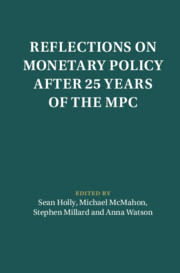Book contents
- Reflections on Monetary Policy after 25 Years of the MPC
- Macroeconomic Policy Making
- Reflections on Monetary Policy after 25 Years of the MPC
- Copyright page
- Contents
- Figures
- Tables
- Contributors
- I Overview
- II Communication
- III Targets and Instruments
- IV MPC Process
- V Lessons for Central Bank Independence
- 13 The MPC
- 14 Outlines of a Reform Programme for the UK’s Monetary Regime
- Annex: Details on the methodology for the classification of level of disagreement
- Index
- References
14 - Outlines of a Reform Programme for the UK’s Monetary Regime
from V - Lessons for Central Bank Independence
Published online by Cambridge University Press: 14 November 2024
- Reflections on Monetary Policy after 25 Years of the MPC
- Macroeconomic Policy Making
- Reflections on Monetary Policy after 25 Years of the MPC
- Copyright page
- Contents
- Figures
- Tables
- Contributors
- I Overview
- II Communication
- III Targets and Instruments
- IV MPC Process
- V Lessons for Central Bank Independence
- 13 The MPC
- 14 Outlines of a Reform Programme for the UK’s Monetary Regime
- Annex: Details on the methodology for the classification of level of disagreement
- Index
- References
Summary
This chapter sets out a dozen propositions aimed at underpinning and, perhaps, revitalising Britain’s Monetary Policy Committee and the regime entrusted to it. It has not addressed the many reform proposals - such as merging the MPC and Financial Policy Committee, or having regional representatives on the MPC. Nor has it addressed the incentives of the regime’s parliamentary and other overseers.
Keywords
Information
- Type
- Chapter
- Information
- Reflections on Monetary Policy after 25 Years of the MPC , pp. 169 - 186Publisher: Cambridge University PressPrint publication year: 2024
